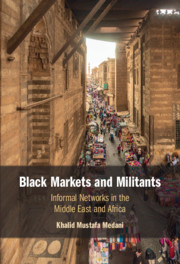Book contents
- Black Markets and Militants
- Black Markets and Militants
- Copyright page
- Dedication
- Contents
- Figures
- Tables
- Acknowledgments
- Preface
- I The Framework
- II The Institutional Context in an Era of Abundance
- III Globalization and Institutional Change in an Era of Scarcity
- 4 Economic Crisis, Informal Institutions, and the Transformation of Islamist Politics in Egypt
- 5 From Remittance Economy to Rentier State: The Rise and Fall of an Islamist Authoritarian Regime in Sudan
- 6 State Collapse, Informal Networks, and the Dilemma of State Building in Somalia
- 7 The Political Economy of Radicalization: Informal Networks and the Rise of an Urban Militant Islamism in Cairo
- Conclusion
- Book part
- Notes
- Bibliography
- Index
6 - State Collapse, Informal Networks, and the Dilemma of State Building in Somalia
from III - Globalization and Institutional Change in an Era of Scarcity
- Black Markets and Militants
- Black Markets and Militants
- Copyright page
- Dedication
- Contents
- Figures
- Tables
- Acknowledgments
- Preface
- I The Framework
- II The Institutional Context in an Era of Abundance
- III Globalization and Institutional Change in an Era of Scarcity
- 4 Economic Crisis, Informal Institutions, and the Transformation of Islamist Politics in Egypt
- 5 From Remittance Economy to Rentier State: The Rise and Fall of an Islamist Authoritarian Regime in Sudan
- 6 State Collapse, Informal Networks, and the Dilemma of State Building in Somalia
- 7 The Political Economy of Radicalization: Informal Networks and the Rise of an Urban Militant Islamism in Cairo
- Conclusion
- Book part
- Notes
- Bibliography
- Index
Summary
Chapter 6 details how the collapse of the State in Somalia led to the emergence of severe inter-clan conflicts. These conflicts were rooted in wrenching political conflicts over the monopolization of labor remittances and local currencies and characterized by continued attempts to institute law and order through military and ideological means. In the wake of state collapse, remittances continue to represent the backbone of the Somali economy. These are transferred through informal banking systems and remain untaxed by local authorities. The informal economy’s efficiency in facilitating currency trade, and the extent to which ethnic and religious networks control access to the wages of expatriate Somali labor is determining the political fortunes of local elite’s and variable patterns of state building in different regions of the country. The Somali case calls into question the very principles and analysis of conventional state building and “sovereignty” of nation states in less developed societies.
Keywords
- Type
- Chapter
- Information
- Black Markets and MilitantsInformal Networks in the Middle East and Africa, pp. 219 - 262Publisher: Cambridge University PressPrint publication year: 2021
- 1
- Cited by

